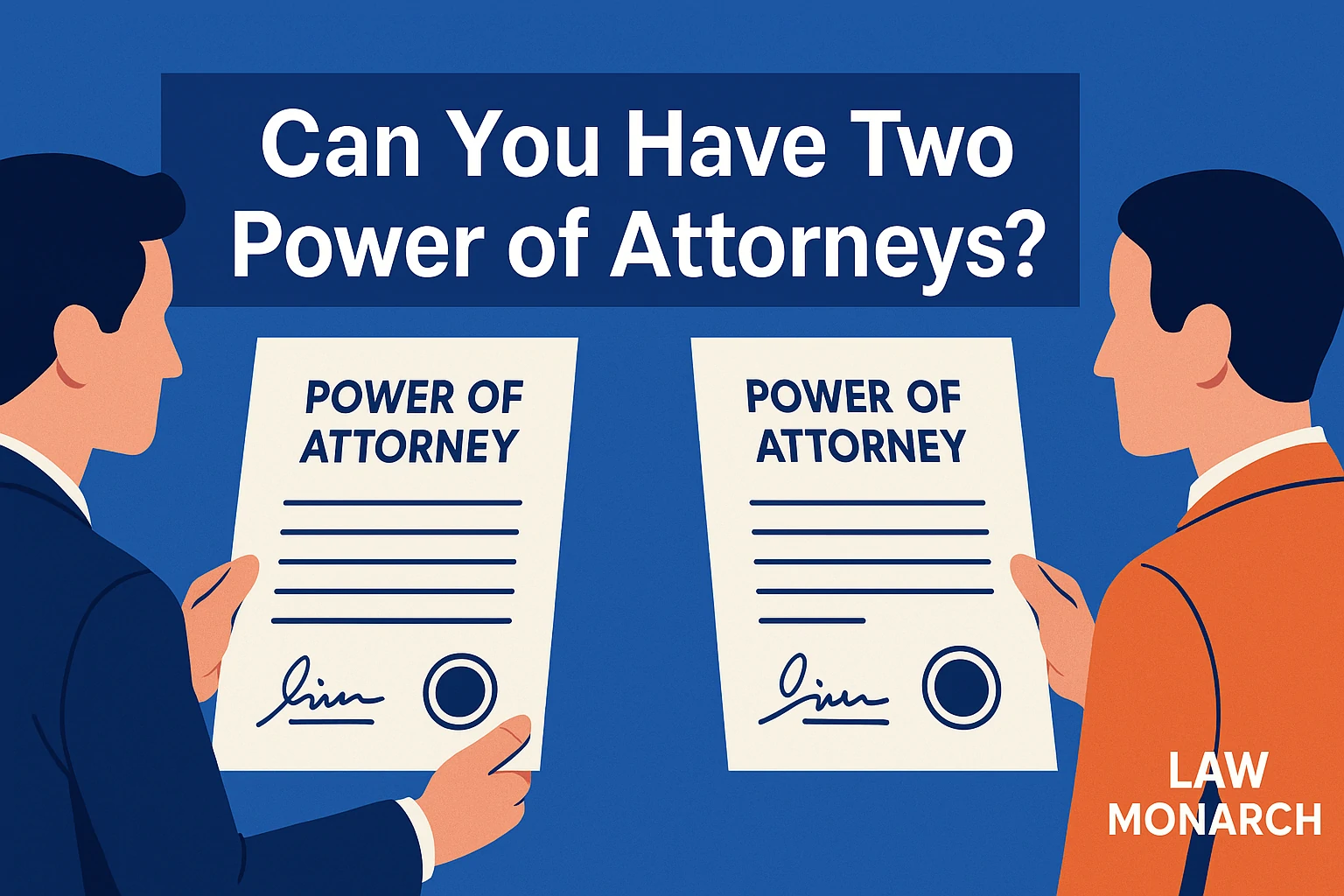Most people believe one power of attorney is enough. They choose someone they trust. That person steps in when they can’t. This setup works well in many situations. But life can be messy. Sometimes, you may want more than one person to help. You may wonder, Can You Have More Than One Power of Attorney?, and if the law allows that.
The answer is yes. You can name two people in your power of attorney. But you must plan it the right way. The law gives you that choice, but the rules must be clear. If your document has unclear terms, your agents may clash or get stuck.
This guide will explain how it works. It will show when you can have two power of attorneys, why some people choose this setup, and what to avoid. You will also see how to write your form in a way that prevents future trouble.
We will keep everything simple and clear. This is not a complex legal guide. It is for real people who want to stay in control.
What Is a Power of Attorney?
A power of attorney (POA) is a legal paper. It lets you give someone else permission to act for you. That person is called your agent. You are called the principal.
Your agent can help with your money, property, or medical choices. You pick what they can and can’t do. You also choose when the power starts. Some POAs start right away. Others only begin if you get sick or lose the ability to decide things.
A POA does not take away your rights. You can still act for yourself unless a court says otherwise. This legal tool helps when you can’t handle things alone. It lets someone you trust take over in those moments.
Can You Name Two Power of Attorneys?
Yes, you can. You have the legal right to name two people as your agents. This is called having co-agents. You can also name a second person as a backup. That’s called a successor agent.
Some people want two agents to work together. Others want one agent to act only if the first one can’t. Both options are valid. But the setup must be clear.
If your power of attorney form is vague, your agents may not know their limits. They may argue. Or worse, others may refuse to follow their orders. That can stop important tasks like paying bills, managing care, or selling property.
So yes, you can name two agents. But you must write the document in a way that works without confusion.
Should Both Agents Act at the Same Time?
You get to choose. You can say both agents must act together. This setup is called joint authority. It works well when you want checks and balance. No one can act alone. Each person must agree and sign.
But this can slow things down. If one agent is away or busy, the other can’t act. Simple tasks may turn into long delays. Banks may ask both people to show up or sign. That makes things harder when you need fast help.
The other option is to let each agent act alone. This is called independent authority. Each person has full power. They don’t need to agree or check in with each other.
This setup works faster. But it has risks. One person could do something the other wouldn’t allow. That can cause problems if they don’t get along.
Think about your agents. Do they trust each other? Can they work as a team? If not, you may want to pick just one or use a backup instead.
What Is a Successor Agent?
A successor agent is your backup plan. You pick one agent now. That person has full power. If that agent dies, quits, or becomes unable to act, the second agent steps in.
This setup works well in most cases. It avoids delays and keeps things simple. You don’t risk conflict between two active agents. But you still get peace of mind knowing there’s a backup.
You can also name more than one successor. You can say: “If Anna can’t act, then Joe will.” And then say: “If Joe can’t act, then Lisa will.” Each one steps in only if the person before them can’t serve.
This method is clean and reduces legal fights. Courts like this setup because it’s easy to follow.
Can You Split Powers Between Agents?
Yes, you can. Some people give financial power to one agent and health power to another. This allows each agent to focus on what they know best.
Let’s say you trust your brother with money and your sister with health decisions. You can fill out two separate POA forms. One for finances. One for health care. You name a different agent in each one.
This setup gives you balance. But it also needs clear limits. Each agent should know what they can and can’t do. If they try to act outside their role, it may cause confusion.
So yes, you can split the job. Just make sure both forms say exactly who does what.
What Can Go Wrong with Two Power of Attorneys?
Having two agents can bring more help. It can also bring more problems. You must think ahead.
Agents may not agree. If they must act together but disagree, nothing gets done. Your health care, bank, or real estate deal may stall.
Agents may act without talking. If they each have full power, they may take actions that don’t match. One may sell something the other wants to keep. That can cause family drama.
Banks and service providers may get confused. If your document is not clear, they may refuse to honor it. They may ask for legal proof or deny your agent access.
To avoid this, you must draft a clean, simple POA. Use plain language. Spell out every role. Make sure each agent understands the job.
What Happens When You Die?
A power of attorney ends at death. It only works while you are alive. After death, your agent loses all power.
At that point, your will takes over. If you have no will, a court decides who handles your affairs.
Many people confuse a power of attorney with an executor. But they are not the same. Your agent acts during your life. Your executor handles things after your death.
If you want a smooth path for your family, you need both a POA and a will. Each plays a different role.
Do You Need a Lawyer?
You do not need a lawyer to create a POA. Many states offer free forms online. You can fill them out and sign them in front of a notary or witnesses.
But if you want to name two agents, or split their duties, legal help is smart. A lawyer can write custom language. They can make sure the document meets your state laws.
Lawyers also help when you expect family conflict or own property in different states. They help you avoid court fights.
If your setup is simple, you may not need a lawyer. But never guess. A mistake on your POA form can hurt you later.
Joint Agents vs Independent Agents
| Joint Agents | Independent Agents |
|---|---|
| Both agents must agree before making any decision. | Each agent can act alone without the other’s approval. |
| Helps prevent mistakes and misuse of power. | Actions are faster because one person can decide on the spot. |
| May reduce the chance of abuse. | Can lead to confusion if agents don’t communicate. |
| Slower in urgent situations if both are not available. | One agent may act in ways the other disagrees with. |
| Best for high trust and teamwork. | Best when agents live far apart or have different schedules. |
One Agent vs Successor Agent
| One Agent | Successor Agent |
|---|---|
| One person has full power at all times. | Second person takes over only if the first can’t act. |
| Easier to manage with no confusion on who is in charge. | Offers a backup plan in case of illness, death, or unavailability. |
| Faster decision-making. | Keeps control with one person at a time. |
| All pressure and duty fall on one agent. | Helps avoid burdening one person long-term. |
| Risk if the sole agent makes poor decisions. | Less risk of sudden gaps in authority. |
Financial POA vs Health POA
| Financial Power of Attorney | Health Care Power of Attorney |
|---|---|
| Lets your agent handle money, bills, and property. | Lets your agent make health and medical choices. |
| Used to manage bank accounts, real estate, or pay debts. | Used to approve treatment, surgeries, or end-of-life care. |
| Agent deals with daily financial tasks when you can’t. | Agent talks to doctors and makes care decisions. |
| Often used in business or estate matters. | Often used in hospitals or during health emergencies. |
| You can choose a different person for this role. | You can name someone else for this role based on medical trust. |
Pros and Cons of Having Two Power of Attorneys
| Pros | Cons |
|---|---|
| More oversight. One agent can watch the other and prevent mistakes. | Slower decisions if both agents must agree on every action. |
| The work is shared. One person does not carry all the pressure. | Agents may argue or disagree, causing delays or legal trouble. |
| Each person can focus on what they know best (money vs. health). | Confusion may happen if roles are not clearly written. |
| You have a backup if one agent becomes sick or unavailable. | Some banks or service providers may not accept unclear documents. |
| It may lower the risk of fraud or misuse of power. | You may face extra legal costs to create or update the documents. |
You may wonder, Can You Have More Than One Power of Attorney?, and whether the law allows that kind of setup.
Final Thoughts
Yes, you can have two powers of attorney. The law allows it. But you must be careful. Write a clear document. Choose agents who trust each other. Explain their powers in detail.
Decide if they act together or alone. Know the risks. Think about your needs, your property, and your health care. Match the setup to your life.
A POA gives someone great power over your life. Choose wisely. Keep it simple. Keep it clear. That way, when the time comes, the people you trust can step in and help you the right way.
Frequently Asked Questions
Q. Can two power of attorneys act at the same time?
Two agents can act together if the document allows it. You must clearly say whether they must agree on every decision or if each can act alone. Without clear rules, confusion may stop them from helping.
Q. What happens if one power of attorney makes a mistake?
The other agent may not have power to fix it unless the form allows joint control. This is why it’s important to choose people who can work well together and understand the limits of their roles.
Q. Is it better to have one power of attorney or two?
That depends on your needs. One agent makes decisions faster. Two agents add safety but may slow things down if they disagree. The right choice depends on trust, timing, and your personal situation.
Q. Can I give one person power over money and another over health?
You can create two separate documents to split duties. This allows one agent to handle finances and another to make health decisions. Each form must clearly list the agent’s powers to avoid overlap.
Q. What if both agents can’t act when needed?
A well-written POA includes a backup plan. You can name successor agents to step in if your primary agents are unavailable. This helps avoid delays in emergencies.




